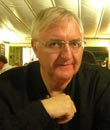
After a five-year stint as Director of the British Centre for Literary Translation and Professor of Literary Translation at the University of East Anglia, Peter Bush now works in Barcelona as a freelance translator. He was awarded the 2009 Calouste Gulbenkian Prize for his translation of Equator by Miguel Sousa Tavares. He edited (with Susan Bassnett) The Translator as Writer and put together the anthology of Cuban stories The Voice of the Turtle. Some of his most recent projects include Fernando de Rojas’s novel La Celestina, Najat El Hachmi’s The Last Patriarch, Quim Monzó’s Guadalajara, Teresa Solana’s Shortcut to Paradise, Josep Pla’s The Gray Notebook, Lorca’s Sketches of Spain, Valle-Inclán’s Tirano Banderas, and Juan Goytisolo’s Níjar Country.
Peter has been a panellist in the Spring/Summer 2010 edition of New Spanish Books. In this interview we ask him about his distinguished career as a literary translator.
Tell us about the start of your career as a translator. What made you become a literary translator?
I started reading literature in French, Latin and Spanish from the age of sixteen and read Spanish and French literature at university. At school we read Balzac, Virgil, Lorca and Co. by translating and I liked doing that and exercises such as translating Cicero into Churchillian English. However, at university I spent more time reading English and American literature. My parents spoke two varieties of non-standard English, from Yorkshire and Lincolnshire, so my mother tongue wasn’t the Queen’s; I already moved in a space of translation within English before starting other languages. I never contemplated being a literary translator. I always wanted to teach the languages and literatures I knew and make the UK a less monolingual, insular culture in that way. In the 1960s there was a lot of political optimism around about changing the world!
It was in the 1980s that I began translating Spanish literature. I had published a critical edition of Campos de Níjar by Juan Goytisolo and when he published the first volume of his autobiography, Coto Vedado, I wrote the English translation for Quartet Books and that was how I began. By that stage I was acting deputy-head at Fortismere School in Haringey, teaching English, French and Spanish literature and implementing multilingual policies. However, I’d caught the literary translation bug and decided I’d rather be a literary translator than the headmaster of a large comprehensive school, particularly given the way Margaret Thatcher was battering state education. I was helped by Stephen Pickles at Quartet who encouraged me to suggest more titles - I proposed a number by Juan Carlos Onetti that I then translated for him.
The Arts Council helped. At the time they gave bursaries for people who were making a career move into the arts. I was awarded one to enable me to go to Buenos Aires and Montevideo for five weeks to research my Onetti translations. I had two other lucky breaks. I could see that economic survival as a full-time literary translator would be somewhat precarious and a family used to two salaries suddenly couldn’t depend on one. I wrote to various producers of television cultural series suggesting a documentary on Juan Goytisolo, I got a number of polite rejections but then had an enthusiastic call from Tariq Ali who had a series Rear Window on Channel Four. As a result I worked as consultant on five documentaries -that involved writing the narratives, interviewing and setting up the programmes and locations with the artists involved. The subjects incuded Chico Buarque, Eduardo Galeano and Tomás Gutérrez Alea ‘Titón’, the Cuban film director. The project with Chico came from a translation with Liz Caldwell at Bloomsbury of Chico’s novel, Estorvo, and the trips to Cuba led to a number of Cuban translations, starting with the original screenplay of Strawberry and Chocolate for Liz Calder and then the anthology of Cuban stories I put together for Quartet, The Voice of The Turtle.
The other break was starting to teach intensive ab initio Spanish for two days a week at what was then Middlesex Polytechnic. When it converted to university status my new Dean, Gabrielle Parker, interviewed all the staff and she wanted to know why I wasn’t bringing my literary translations and work with Spanish and Latin American authors into the university. She suggested I set up an MA in Literary Translation.
Recent data indicates that 2011 has seen an increase in the number of books from Spain published in the UK (89). Will we ever see the UK embracing translations in the way Spain or other continental European countries do?
That is good news but the numbers are still very small compared to translations out of English. I think we need to remain optimistic. There are now many younger literary translators and readers of literary translators. The BCLT and the Translators Association have initiated a number of excellent projects like the Mentoring Scheme and the workshop programme in schools. But it is a hard political and economic climate. There have been surges with crime and historical fiction. If there could be a surge in translations of literature for children and adolescents and a place for literary translations in the national curriculum, it would be a major step forward. The reality is that since the 1980s there has been a decline of the presence of the ‘foreign’ in the public realm - from newspapers to curriculum content - though UK society has become de facto a much more multilingual, multicultural society. The distance from Europe is huge in that respect.
A personal anecdote by way illustration. My eight-year old daughter currently starts her morning off at her Catalan school by reading her third book from a series of vampire stories translated into Spanish from German and published in the 1990s. She chose the book at our local library. The translation is quite clunky and there are a number of footnotes explaining wordplay but she takes that in her stride. The local and school libraries are full of children’s fiction in translation. Eight-year olds here read translations as a matter of course all the time. Catalan and Spanish cultures can be very nationalistic but in terms of reading both are very open.
Why is literature in translation important?
It releases writers and readers from the confines of their national languages and cultures and brings a limitless variety of new pleasures on paper or electronically.
You live in Barcelona and work with Spanish publishers and authors. Is there a particular characteristic that differentiates the Spanish industry from that of other countries?
In terms of literary translation, with very few exceptions, ridiculously short deadlines and ridiculously low rates of pay. Spanish publishers give very short deadlines, then employ an army of ‘correctores’. It is an industry that is keen on translation, often promotes foreign authors very well, but neglects the welfare of those who actually create the words they are selling.
Who are your favourite authors in Spanish and in Catalan?
That’s difficult. I have so many. At the same time my patterns of reading mean I am always turning up new favourites in those languages as well as going back to Cervantes, Cernuda or Rodoreda, say, and I probably read more literature in English. What is favourite can also depend on mood. Favourites I am really keen to read more of right now are novelist Gabriel Miró and poet Andrés Sánchez Robayna in Spanish, and in Catalan, polymath Josep Pla, and short-story writer Pere Calders
An author that you have not yet translated and you would love to translate?
El libro de buen amor by Juan Ruiz, the Arcipreste de Hita
Which has been the most challenging book that you have ever translated and why?
Tirano Banderas by Ramón del Valle-Inclán. The combination of the narrative pace of a spaghetti Western on fast forward with Flaubert’s subtlety of language, except that Valle milks the entire Spanish world for his language, spices it with dashes of camp and Cubism and lards it with parodies of his least favourite Romantics and modernists. Conversely, it is a most incisive portrait of the grotesque savagery of military dictatorship.
Can you name one favourite word in Spanish and one in Catalan?
‘Aleatorio’ in Spanish and ‘esqueixada’ in Catalan
Anne McLean and you are receiving the Spanish Cross of the Order of Civil Merit from the Spanish Ambassador, in recognition of your contribution to making Spanish literature known to a wider public. What are your feelings about the award?
I see it as public recognition of the role of literary translators.
Do you believe that the work of translators should be made more visible? How?
Literary translators should be given the same recognition as concert musicians. Without us works of literature remain trapped in their original language like so many musical scores. Translators give them new lives that are necessarily re-interpretations, imaginative transformations. Literary translations into English should be taught as part of English literature courses in schools and universities -they are an important part of English literature. Literary translators are unique writers of literary English. However, their work should be read as translations. There are critical ways of reading translations with and without any knowledge of the original language. Such an approach would make translators more visible and increase the sale of translations massively.
You have translated many of Juan Goytisolo’s books. How did your relationship come about?
I was Head of Languages at Holland Park School in West London – where I had made Spanish the first modern language – when the idea of literary translation came up in a conversation with John Lyons, the translator of Ernesto Cardenal, who was a colleague. We were talking about how to balance our lives as teachers with our love of literature, I was rhapsodizing about the brilliance of Coto vedado and he said why not contact the author about translating it. I did just that and a couple of years later signed my first contract with Quartet Books – with the help of Juan Goytisolo and his agent, Carmen Balcells. Quartet published my translation with North Point Press in San Francisco. It was North Point and the poet and editor Barbara Ras who were my first editors. Juan and I get on well and I translate his fiction and non-fiction. I send him my final drafts and queries and he always responds very helpfully. He asks his translators to be creative and allows them that necessary freedom. I’ve been translating him now for over twenty-five years and consider I was very fortunate to start my career with his Forbidden Territory.
What’s the essence of a good translation?
A good translation should emulate the rhythms of the original and be bold in its language. If a writer like Juan Goytisolo sets out to dynamite conventional literary Spanish, then his translator shouldn’t be deferential to literary fashion in English. The same goes for the translation of good literature of whatever kind, crime fiction, for example. Whether the narrative movement is mainly in the language or in the action, the translation should have a spontaneous, fresh feel to it, even though it is the product of many drafts, lots or research... or the original was written six hundred years ago.
What are you working on at the moment and what are your future projects?
I am working on different stages of two Catalan classics, The Gray Notebook by Josep Pla and Uncertain Glory by Joan Sales and a collection of stories by Francesc Serés, Russian Tales. And on final, final edits of Sketches of Spain: Impressions and Landscapes by Lorca. This is Lorca’s first book and has never been translated before. The publishers, Serif, commissioned Julian Bell to go to Spain and sketch some of the places Lorca describes and they are a striking compliment to the text. And of La plaça del Diamant by Mercè Rodoreda, one of the great novels of the Spanish civil war and its aftermath, that is, with Uncertain Glory. After these classics, I will be translating fiction by two contemporary Catalan writers: The Zen Moment by Teresa Solana and The Body Hunter by Najat El Hachmi
Finally, what advice would you give to a young translator starting his/her career?
Join the Translators Association, think laterally, be pro-active and avoid bemoaning the insularity of the English-speaking world.
Feature Article
Welcome to the New Spanish Books Website, a guide to...
Interview
Helen Weir - Senior Editor at Two Hoots, an illustrated imprint of Pan Macmillan.
READ MORE
Search
Genre

BOLETIN INFORMATIVO
Suscríbete a nuestro newsletter
Haz clic aquí
SOBRE NOSOTROS
Bienvenido al sitio web de Nuevos Libros en Español, una guía para...

